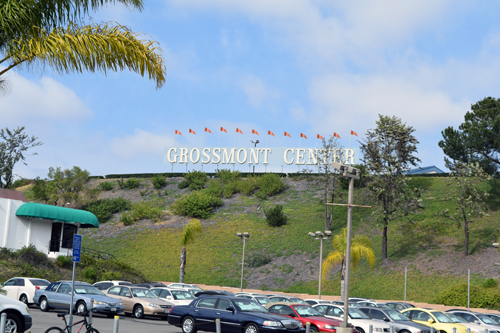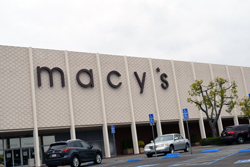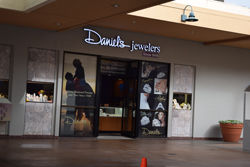
-41st in a Series–
Exit 13B, Jackson Drive, La Mesa ~ Grossmont Center, The Legacies of Adolph Levi, Nathan Straus, Isaias Hellman, and Joseph Sherwood
By Donald H. Harrison

LA MESA, California – When you see the large “Grossmont Center” sign on the hillside above Jackson Drive, what images come to mind? How about the signs for “Macy’s,” “Wells Fargo” or “Daniel’s Jewelers?”
I love Jewish history, so I think about a quartet of Jewish entrepreneurs — people like Adolph Levi, Nathan Straus, Isaias Hellman, and Joseph Sherwood—all of whom are represented at the Grossmont Center.
I’ll start with Adolph Levi, as he was mentioned in a previous article in this series about the Riverwalk Golf Course.
Levi came to San Diego in 1877 and went to work for his brother, Simon Levi, at the general merchandise wholesale firm of Steiner, Klauber and Levi, when San Diego was still a small town with lots of raw acreage for sale at affordable prices.
Eventually, he bought a ranch and established a small general store in Julian—the first one there of brick construction—but his wife, whom he met while attending a family wedding in Austria, felt too isolated in the back country of San Diego County. So Adolph moved to the City of San Diego, opening a livery stable and later investing heavily in real estate. He purchased huge swaths of land throughout San Diego County. Among his holdings were large portions of Mission Valley in which the Riverwalk Golf Corse today is a vestige, and he also owned the 125-acre piece of land in La Mesa on which the Grossmont Center stands.
In 2015, Levi’s great-grandson Stephen Cushman controlled those properties and announced plans to transform both into mixed residential and commercial developments in the future.
A remarkable thing about Levi was not that he acquired so much land during San Diego’s salad days, but that generations of his family held onto it for it so long. The profit they may someday realize from that land may be many fold more than Levi ever could have imagined.

Macy’s is one of the anchor tenants of the Grossmont Center and although the department store chain was started in Talbotton, Georgia, by R.H. Macy, it was propelled to worldwide fame by two German Jewish brothers, Isidor and Nathan Straus, who originally sold crockery at Macy’s store and subsequently became his partners, and eventually his successors.
Isidor had a promising career, having served as a U.S. congressman and as president of the Educational Alliance, which sought to extend education to many underserved segments of society. U.S. President Grover Cleveland offered Isidor a job as his Postmaster General but he declined. Another brother, Oscar, however, would become U.S. Secretary of Commerce and Labor under President Theodore Roosevelt.
Isidor Straus and his wife Ida were among the 1,500 passengers and crew who drowned April 15, 1912, on the ill-fated maiden voyage of the RMS Titanic.
In addition to being a co-owner of Macy’s, Isidor’s brother, Nathan Straus, was an early advocate for the pasteurization of milk and also opened a treatment center in New Jersey for children with tuberculosis. At another of the Straus family businesses, Abraham & Straus, Nathan inaugurated a subsidized company cafeteria to help employees stretch their paychecks. After the outbreak of World War I, Straus devoted much of his philanthropy to the aid of war orphans. He also was a major benefactor of the New York City Public Library.
A school for girls in Israel also was another of his philanthropies, along with the Nathan and Lina Straus Health Center in Jerusalem, which was later incorporated into Hadassah Medical Center.
The city of Netanya, Israel, was named in his honor, as was Rehov Straus in Jerusalem.

Another of the many establishments doing business in the Grossmont Center is Wells Fargo Bank, which thanks to years of their advertising may conjure up images of stage coaches hurtling through the Wild West – a driver and the “shotgun” guard riding up on the top, and, sitting inside, passengers being jostled by the hooves of teams of horses galloping over uneven, bandit-infested dirt roads.
One can also think of Isaias Hellman, who started his business career with a dry goods store in Los Angeles. Customers who had no other place to store their gold asked him to keep it for them in his safe. This led to him becoming partners with former California Governor John Downey and forming the Farmers and Merchants Bank in 1871, which made loans to such worthies as Harrison Gray Otis for the start up Los Angeles Times and to Edward Doheny for oil drilling operations.
Hellman invested in various utilities, including an electric railroad with Henry Huntington, and also presided in 1872 over B’nai B’rith when that organization was building the Jewish community’s first temple in Los Angeles. Like Adolph Levi after him, he purchased large tracts of land. He moved to Northern California to look after an investment in the Nevada Bank, and after he took that bank over, he was joined by such investors as blue jeans manufacturer Levi Strauss and Mayer Lehman, the latter of the Lehman Brothers.
In 1905, Hellman merged his Nevada Bank with Wells Fargo, and just a year later came the great California earthquake. Although some of the bank’s buildings were destroyed, its vault was not and Wells Fargo remained open for business, which for a time Hellman transacted out of his home.
Banking sachel ran in the blood of the Hellmans, three generations of whom directed the affairs of Wells Fargo..
On a smaller scale, but nevertheless impressive, was the success of Joseph Sherwood in creating the chain of Daniel’s Jewelers throughout Southern California.

Sherwood had worked in jewelry stores for 17 years until the occasion arose in the economic expansion era after World War II when he could purchase another store in Bell Gardens, California.
He and his wife Helene extended credit to local residents who returned the favor with their loyalty. A generous man by nature, Sherwood could be counted on to make donations to charitable causes, increasing the esteem with which he was held. Gradually he was able to expand his operation to multiple locations. His sons, Howard and Larry, followed him into the business and they in turn were followed by Larry’s son, David, who became the company’s CEO, and by Howard’s daughter, Laurie Bahar, who heads the Sherwood Family Foundation.
Under auspices of the Anti-Defamation League, the family established the Sherwood Prize for law enforcement officers in Southern California who promote inter-group understanding and multiculturalism. Additionally, the Sherwoods have been enthusiastic in their support of Jewish Family Service in Los Angeles.
In an interview with JFS, Sherwood explained: “My parents were always involved in the well-being of our community. We never had much money, but my father in particular, was very concerned with children going to bed hungry and older adults being properly cared for. Some of my earliest memories are of my father collecting food for hungry families. We barely had enough for ourselves, but still, he couldn’t go to bed at night knowing someone was in need.
“Even when he was sick with cancer, my father was adamant that it was our responsibility to care for our neighbors – Jewish and non-Jewish. I lost my father when I was young, he was about 45 years old when he died, but what he instilled in me was one of the most valuable lessons a parent could ever teach a child. I learned about the importance of helping others. That advice brought me a lot of luck in my business and it helped me meet a lot of wonderful people but most importantly it brought me a lot of joy. There is no greater feeling than what comes from helping someone in need.”
Next: New Jewish pioneers of the West
*
Harrison is editor of San Diego Jewish World. You may comment to him at donald.harrison@sdjewishworld.com. Any comments in the space below should include the writer’s full name and city and state of residence, or city and country for non-U.S. residents.
__________________________________________________________________